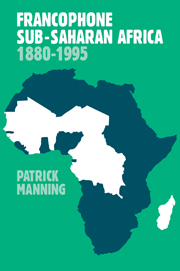Book contents
- Frontmatter
- Contents
- List of illustrations
- Acknowledgments
- Note on the second edition
- Map 1 Francophone sub-Saharan Africa in 1995
- 1 Prologue
- 2 Economy and society, 1880–1940
- 3 Government and politics, 1880–1940
- 4 Culture and religion, 1880–1940
- 5 Economy and society, 1940–1985
- 6 Government and politics, 1940–1985
- 7 Culture and religion, 1940–1985
- 8 Democracy and dependence, 1985–1995
- 9 Epilogue
- Bibliographical essay
- Index
7 - Culture and religion, 1940–1985
Published online by Cambridge University Press: 12 January 2010
- Frontmatter
- Contents
- List of illustrations
- Acknowledgments
- Note on the second edition
- Map 1 Francophone sub-Saharan Africa in 1995
- 1 Prologue
- 2 Economy and society, 1880–1940
- 3 Government and politics, 1880–1940
- 4 Culture and religion, 1880–1940
- 5 Economy and society, 1940–1985
- 6 Government and politics, 1940–1985
- 7 Culture and religion, 1940–1985
- 8 Democracy and dependence, 1985–1995
- 9 Epilogue
- Bibliographical essay
- Index
Summary
For two weeks in the spring of 1966, Dakar was the cultural capital of Africa. The First World Festival of African Arts and Culture brought writers, musicians, sculptors, artisans, and griots from every corner of Africa to the capital of Senegal on the tip of Cape Verde. President Léopold Senghor, the renowned poet of négritude, inaugurated the festivities. Performances, celebrations, lectures, and debates ensued in the conference halls, on the streets, in restaurants, and in the artisanal village of Soumbedioune, constructed at the seaside especially for the festival. African culture had regained its self-confidence, and it was the French-speaking Africans who led in proclaiming its renaissance.
Then the festival came to an end. The artists and writers returned home, and Dakar settled back into its workaday life. The modern achievements of African culture were certainly imposing when the creators were focused into a single location. But the difficulties, the deficiencies, and the crises in African culture re-emerged as the cultural leaders dispersed. Disputes among African artists, while creative in themselves, were also costly. Wole Soyinka, the Nigerian playwright, criticized the notion of négritude by noting that a tiger does not have to proclaim his “tigritude.”
While colonial rule itself had ended, the spectre of Western cultural discrimination against Africa remained, just as the neocolonial influences of Western corporations and governments continued to constrain the growth of African economies. And, as with neocolonial economic life, some of Africa's cultural oppression was self-inflicted.
- Type
- Chapter
- Information
- Francophone Sub-Saharan Africa 1880–1995 , pp. 161 - 179Publisher: Cambridge University PressPrint publication year: 1999



